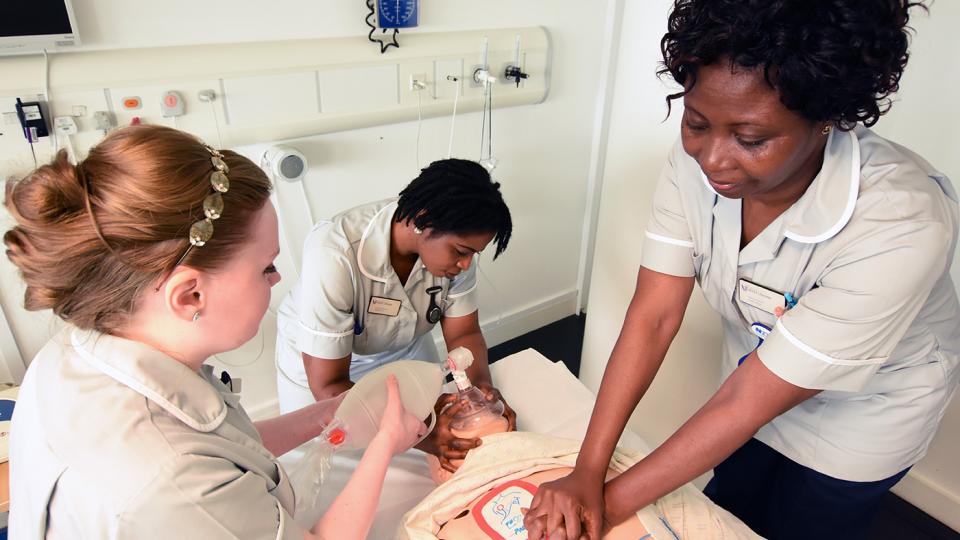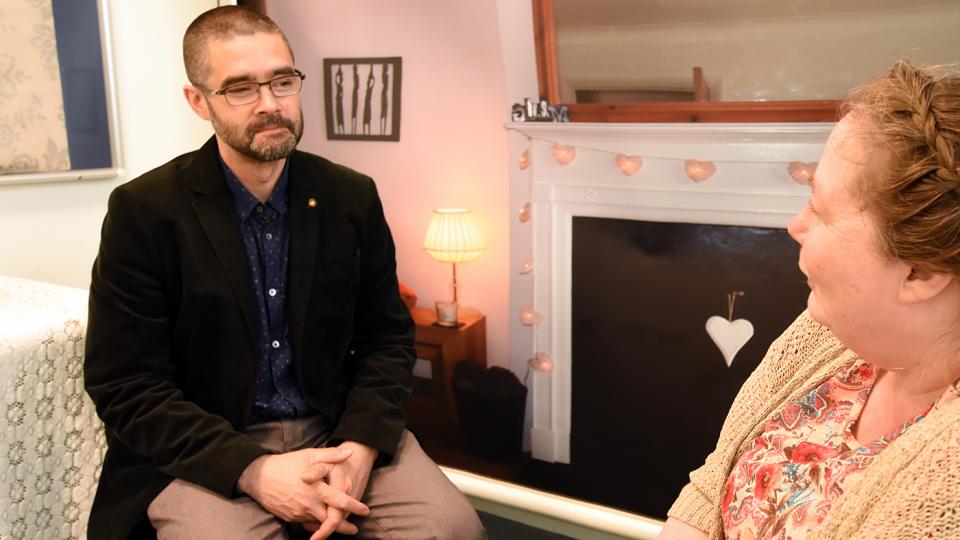
Nursing (pre-registration)
Nursing (pre-registration)
With our on-campus simulation centres, inspiring teaching team and close partnerships with NHS Trusts and private healthcare providers, it is no surprise our general nursing courses are ranked 2nd in London in the Guardian University Guide 2025*.
Our ever-popular mental health nursing courses are ranked fourth in the UK and number one in London in the Guardian University Guide 2025*.
We offer a range of nursing degree courses based at our West London and Reading campuses. As a student nurse, you can specialise in one of our four nursing pathways:
- Adult Nursing
- Children's Nursing
- Mental Health Nursing
- Learning Disabilities Nursing.
With a nursing degree, you will be able to register with the Nursing and Midwifery Council (NMC) and become a professional fully qualified nurse.
Nursing (pre-registration) undergraduate courses
-
BNursing (Hons) Adult - Entry Point for Registered Nursing Associates (Berkshire Institute for Health)
Berkshire Institute for Health
-
BNursing (Hons) Adult Nursing (West London Campus (also offered in Reading))
West London Campus (also offered in Reading)
-
BSc (Hons) Adult Nursing (West London Campus (also offered in Reading))
West London Campus (also offered in Reading)
-
BNursing (Hons) Adult Nursing (Berkshire Institute for Health)
Berkshire Institute for Health
-
BSc (Hons) Adult Nursing (Berkshire Institute for Health)
Berkshire Institute for Health
-
BSc (Hons) Children's Nursing (Berkshire Institute for Health)
Berkshire Institute for Health
-
BSc (Hons) Children's Nursing (West London Campus (also offered in Reading))
West London Campus (also offered in Reading)
-
BSc (Hons) Learning Disabilities Nursing (West London Campus)
West London Campus
-
BSc (Hons) Mental Health Nursing (Berkshire Institute for Health)
Berkshire Institute for Health
-
BSc (Hons) Mental Health Nursing (West London Campus (also offered in Reading))
West London Campus (also offered in Reading)
-
MSci Nursing Dual Field (Adult and Mental Health) - London (West London Campus (also offered in Reading))
West London Campus (also offered in Reading)
-
MSci Nursing Dual Field (Adult and Mental Health) - Reading (Berkshire Institute for Health)
Berkshire Institute for Health
-
MSci Nursing Dual Field (Children's Nursing and Mental Health) (West London Campus (also offered in Reading))
West London Campus (also offered in Reading)
-
MSci Nursing Dual Field (Children's Nursing and Mental Health) (Berkshire Institute for Health)
Berkshire Institute for Health
Nursing (pre-registration) postgraduate courses
-
PgDip Nursing (Adult) (West London Campus (also offered in Reading))
West London Campus (also offered in Reading)
-
PgDip Nursing (Adult) (Berkshire Institute for Health)
Berkshire Institute for Health
-
MSc Nursing (Adult) Blended Learning – Pre-registration (West London Campus (also offered in Reading))
West London Campus (also offered in Reading)
-
MSc Nursing (Adult) Blended Learning – Pre-registration (Berkshire Institute for Health)
Berkshire Institute for Health
-
MSc Nursing (Adult) On Campus – Pre-registration (West London Campus)
West London Campus
-
PgDip Nursing (Learning Disabilities) (West London Campus (also offered in Reading))
West London Campus (also offered in Reading)
-
PgDip Nursing (Learning Disabilities) (Berkshire Institute for Health)
Berkshire Institute for Health
-
MSc Nursing (Learning Disabilities) Blended Learning – Pre-registration (West London Campus (also offered in Reading))
West London Campus (also offered in Reading)
-
MSc Nursing (Learning Disabilities) Blended Learning – Pre-registration (Berkshire Institute for Health)
Berkshire Institute for Health
-
PgDip Nursing (Mental Health) (West London Campus (also offered in Reading))
West London Campus (also offered in Reading)
-
PgDip Nursing (Mental Health) (Berkshire Institute for Health)
Berkshire Institute for Health
-
MSc Simulated Practice Education (West London Campus)
West London Campus
-
MSc Simulated Practice Education (Berkshire Institute for Health)
Berkshire Institute for Health
Course videos
How can I become a registered nurse?
Watch the video to learn about how to become a registered nurse and the different nursing pathways you can take.
How can I become a registered nurse?
-
What is a BNursing qualification?
A BNursing (Hons) degree course is simply a BSc Honours in Nursing.
-
Why study nursing at the University of West London?
Developed with our partners in the NHS and private/voluntary sector along with service users, our pre- and post-registration programmes are respected by employers. Our close links with NHS organisations in West London, Berkshire and the region also provide lots of placement practice opportunities. You’ll be taught by a passionate, highly experienced teaching team using innovative methods, including (where applicable) the use of one of our high-tech simulation centres, equipped with the latest learning aids.
Completing one of our pre-registration nursing courses will enable you to apply for registration with the Nursing and Midwifery Council.
-
What do I need to study nursing?
Each of our nursing courses has its entry requirements listed on its dedicated page. There you can find out more about academic requirements, our interview process and other tests and checks as applicable. You may be required to complete an online English and Mathematics assessment, and your offer may be subject to satisfactory enhanced Disclosure and Barring Service (DBS) and occupational health checks.
-
How can I find out more about nursing courses at UWL?
You’ll find detailed information about our nursing courses on the pages above, and if you’re interested in seeing our campus(es) first-hand, you might be interested in attending one of our nursing and midwifery open days. These are a great way for you to find out more about university life, speak to some lecturers and discover some of our facilities.
-
How do I apply for a post-registration nursing degree?
How to apply
How to apply for post-registration nursing courses
If you are a registered nurse or midwife and wish to progress further, we offer a range of post-registration courses.
Apply direct to us for post-registration courses. Please contact postregadmissions@uwl.ac.uk.
-
How do I apply for a pre-registration nursing degree?
Applications for pre-registration nursing and midwifery courses should be made via the Universities and Colleges Admissions Service (UCAS).
The University of West London's institution code on UCAS is, W05.
The UCAS website explains the application procedure - please read this carefully.
As health professionals, you will need to be numerate and literate in order to provide safe, effective and high-quality care and to be registered with the Nursing and Midwifery Council (NMC).
Prior to application, you must make sure that you meet, or are working towards meeting, the entry criteria which includes Maths and English GCSEs and the equivalent of A-level qualifications. Midwifery courses also require a science-based GCSE / or level 2 equivalent.
How your application is processed
1. Applications are made via UCAS. Please ensure your application is on time and all sections are completed to the best of your ability.
2. The UWL admissions team check that you have met entry criteria and bursary / residential eligibility. If you meet these criteria your application will be sent to the college admissions tutor and associated academic staff within the field you have chosen to study.
3. They will review your qualifications, ensuring that your academic history is suitable and that you have studied within the last 5 years. They will also review your personal statement and your reference. Both play an important role in your application. Please see how this is done below and also see our guidance on writing a personal statement.
4. Your personal statement: we expect this to be articulate, accurate and well organised. We will expect you to include information about your motivation and commitment to study your chosen field and about your insight into the demands of the course. At this stage we do not expect you to be an expert in the field, but have a basic understanding of your chosen profession and what you have done to inform your decision to embark on this career pathway. This may include any reading you have done and any related experience you may have undertaken.
5. Your reference: this must be from a reliable source, as current as possible and demonstrate your suitability.
6. We will not base our decision upon any of your demographic details or your employment history. However, recent employment, volunteering and participating in related activities will help to demonstrate your ability to cope with a demanding programme of combined study and practise, as well as to demonstrate your commitment to your chosen field.
7. If you meet the above criteria you will be invited to a selection event. This consists of a group activity and an individual interview.
8. You will only receive an offer of a place on a course if you are successful at the selection event.
For further information see the how to apply pages in the prospective students section.
You can also call our Admissions team on 020 8231 2220.
Applicants with a disability or specific learning difficulty
If you have a disability or specific learning difficulty and require support or reasonable adjustments for your interview or selection test, please contact the Disability Support team in advance so that we can discuss your requirements.
-
What should I put in my personal statement?
Your personal statement is an important part of your application for a pre-registration Nursing course.
Take a look at this page for some information about how to put it together.
Facilities
Explore our nursing facilities.
Cutting-edge simulation centres
Our simulation centres at our West London campus and the Berkshire Institute for Health accurately recreate hospital wards and contain a host of innovative teaching resources, to enrich your education and prepare you for your career.
Simulators
Develop your knowledge and professional skills with the aid of our simulators, including Aries and Lucina.
Professional equipment
Access to professional equipment enables you to combine theory and practice, helping you to graduate 'career-ready'.
Community Room
The Community Room at our West London campus helps to create a realistic setting for home visits.
Patient transfer
Prepare for a range of tasks and scenarios under the guidance of our passionate, highly experienced teaching staff.
Where this course can take you
Job roles
Many nursing graduates begin their careers with local NHS Trusts or healthcare organisations which can offer a range of nursing jobs and opportunities to develop.
Our graduates have also developed career paths in the following fields:
- counselling
- education
- management
- medicinal chemist
- therapy
- policing
- social working
- private sector.
























